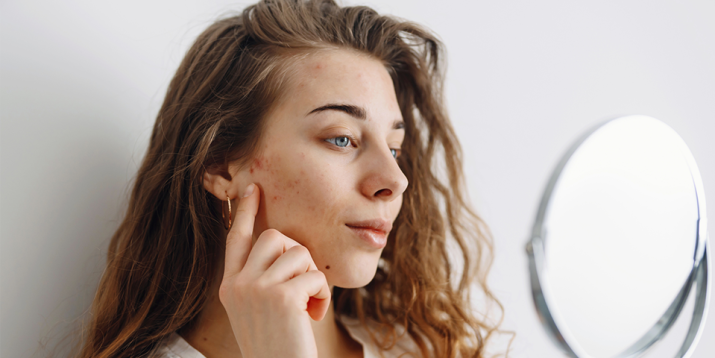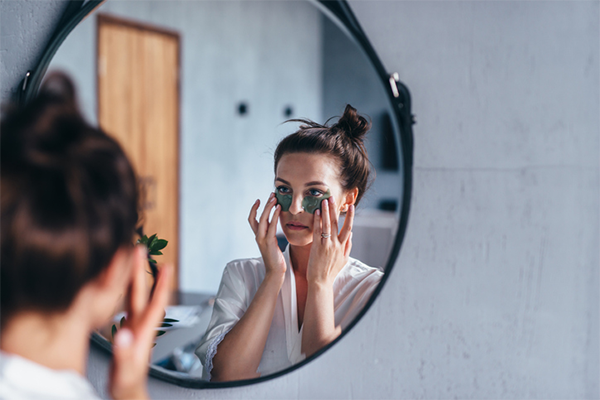6 Sneaky Ways Stress Affects Your Skin

Your diet, sleep habits, and skincare routine aren’t the only factors that can affect your skin. Stress can also play a role in your skin’s health and appearance. With too much stress, red dots on skin can appear, as can wrinkles.
For more insight into preventing stress-related skin problems, we spoke with two dermatologists about the link between stress and skin health.
Here are six ways stress affects your skin — and what to do about it.
1. It Can Cause Breakouts
You may be more likely to suffer from breakouts when you’re stressed.
That’s because stress increases your body’s cortisol production, which in turn “can send signals to your oil glands to rev up oil production,” says Dr. Rachel Nazarian, FAAD and board-certified dermatologist at Mount Sinai Hospital in New York. Oilier skin can lead to clogged pores and breakouts.
2. It Can Dry Out Your Skin

It’s not just cold winter weather that can dry out your skin. Stress can also leave your skin feeling dry, rough, itchy, or flaky.
“The increase in systemic cortisol due to emotional stress can make it harder for skin to hold onto hydration, leaving it dehydrated,” says Dr. Tsippora Shainhouse, FAAD, a board-certified dermatologist in private practice at SkinSafe Dermatology and Skin Care.
Fortunately, you can prevent dryness by using a moisturizer with ceramides (a family of waxy lipids), which Shainhouse says can seal in moisture.
3. It Can Cause Rashes
If you develop red spots or little red dots on your skin, stress could be the culprit.
“[A stress] rash may vary, person to person, but they’re often based in inflammation and irritation,” Nazarian says.
While some rashes are flaky, she adds, others take the form of itchy red bumps or welts like hives. There are several possible causes for hives, including stress, allergic reactions, viral illnesses, and certain medications, Nazarian says.
If you think you’re dealing with stress hives or a rash, antihistamines can help. However, it’s a good idea to consult your dermatologist or doctor for advice.
4. It Can Lead to Under-Eye Bags

If you have trouble sleeping because you’re stressed, Shainhouse says you may wake up with dark, heavy bags under your eyes.
“Moreover, if you stay up late and binge on salty snack food or alcohol, you may be causing your face to look puffy and bloated,” she says.
For calmer, tighter skin, Shainhouse recommends limiting alcohol and salty food near bedtime. And if your under-eye skin is still looking dark or puffy, try using a caffeine or green tea serum in the morning, she suggests; these can help soothe your skin and reduce puffiness.
5. It Can Worsen Underlying Skin Conditions
One of the most significant ways stress affects the skin is by exacerbating underlying skin conditions.
“People who have a history of eczema and psoriasis — both inflammatory skin conditions — may experience flare-ups during times of emotional stress,” Shainhouse says, “possibly due to increased cortisol, which increases inflammation in the body.”
To prevent flare-ups, it’s crucial to pay attention to your stress levels, engage in relaxing activities, regularly take your skin medication, and keep your skin moisturized, says Shainhouse.
“If you can’t get your skin under control using your usual regimen, see your board-certified dermatologist for evaluation and management,” she adds.
6. It May Accelerate Skin Aging

As if stress didn’t cause enough trouble already, it can also give you more wrinkles and fine lines over time.
“Chronic stress can cause premature aging of our skin by causing damage to parts of our DNA,” Nazarian says. “There may also be a cascade of events triggered by stress that can decrease the connective tissue in our skin, decreasing collagen elastin fibers. Ultimately this leads to more wrinkling and sagging and bagging of skin.”
To protect your skin, “Consider using a topical retinoid at bedtime to stimulate collagen growth, and an antioxidant serum in the morning to prevent collagen damage,” Shainhouse suggests.
She adds that wearing sunscreen every day is also key to preventing premature skin aging or UV-induced skin damage.
How to Take Better Care of Your Skin
If you’ve experienced stress-related skin issues, it’s time to make some changes to your lifestyle and daily routine.
Eat less sugar
Cutting back on sugar and getting more nutrients in your diet may help lower your stress and support your skin.
“Look for berries, green tea, pomegranate, salmon, and other foods that benefit your skin and have skin-calming ingredients,” Nazarian says.
Get more sleep
You should also aim to score at least seven hours of quality sleep a night, exercise every day, follow a meditation or mindfulness practice, and say no to activities and projects for which you don’t have time or energy.
